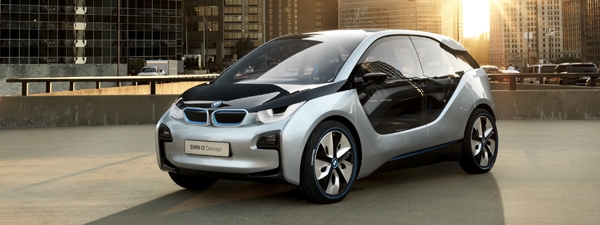Most experts agree that the eventual dominance of electric vehicles depends on a big breakthrough in battery technology. With researchers around the globe feverishly working on such an advance, there’s no question (except among the most rabid EV-haters) that it will happen. If you ask when the big break will occur, however, you’ll find a broad range of disagreement.
Sources at BMW, which will soon be launching its new i3 EV, recently told Neil Winton of the Detroit News that they expect battery capacity to double within four to five years, enabling vehicles with twice the range of today’s EVs. BMW board member Ian Robertson told Winton that lithium-air technology will be the key, and that the next three to four years will see more progress in battery development than the previous 100 years.
Winton said he was “stunned” at such an optimistic prediction, and polled several auto analysts for their takes on the timeline.
Peter Fuss of Ernst & Young believes lithium-air batteries will be available 3-7 years from now. “I generally agree with BMW’s statement. Whether the improvement of performance is 2, 5 or 10 times is also very difficult to predict. However, based on my discussions (with engineers and universities) I always hear the quote ‘the improvement of performance through lithium-air technology will be significant’ – this will be more than just double the performance.”
Al Bedwell, an analyst with LMC Automotive in England, is more skeptical. “I’d say that there is a long way to go before lithium-air batteries are fully commercialized. Zn-air, Li-sulphur and Li-air are all promising technologies that can make a radical difference to EV range but not for a while. The consensus as I understand it is that we are looking at 2020 to 2025 before these new chemistries appear at an affordable cost. In the meantime we are pretty much stuck with L-ion at best, along with the limitations that it imposes.”
Frost & Sullivan analyst Nicolas Meilhan doesn’t expect to see lithium-air batteries before 2030, and believes that saving weight is more important. “Cutting the weight of the car in half means a similar cut in the power needs of the battery. If you halve the weight you could have a smaller battery which will take between two or three hours to charge.” However, Meilhan said BMW’s reliance on carbon fiber to save weight is too expensive.
Phil Gott, an analyst for IHS in Lexington, Massachusetts, sees recharging times as a bigger issue than battery capacity. “Batteries are not the limiting factor, but the amount of energy you can suck out of the socket in the wall. As things stand you’re not going to do away with long recharging times. Wireless charging and recharging times need to be addressed.”
Gartner analyst Thilo Koslowski found it odd that BMW would make such an ambitious prediction just before the launch of the i3. “Four years – that’s a typical leasing time for an automobile. What will it be worth after four years if the battery is only 80 or 90 percent of its original capacity and there’s a new one out there giving 100 percent more?”
Source: Detroit News



















































































